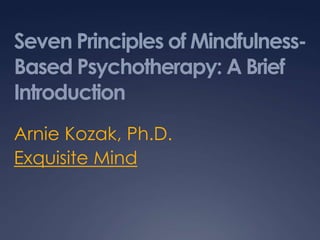
7 Principles of Mindfulness-Based Psychotherapy
- 1. Seven Principles of Mindfulness-Based Psychotherapy: A Brief Introduction Arnie Kozak, Ph.D. Exquisite Mind
- 2. Overview The first three principles of mindfulness-based psychotherapy are implicit. They can be developed and practiced without explicitly introducing mindfulness into therapeutic work. They contribute to our self-development as clinicians and are essential for being present in our work and not succumbing to burnout. If you just use principles 1 to 3 we can think of this as mindfulness-informed psychotherapy. Principles 4 to 7 provide guidance on how to integrate mindfulness in treatment to provide the vast benefits of mindfulness to our patients and clients. We can think of this as mindfulness-based psychotherapy. .
- 3. Principle 1: Be Present, Be Still Mindfulness brings a space of quiet and stillness into our lives. By practicing we commit ourselves to time spent without talking and without pursuing the talk of the mind in our customary ways. Being mindful allows us to find spaciousness in the present moment. As therapists and counselors we need this stillness for ourselves, to preserve and nurture our own well-being. We also need it to be fully present in the clinical encounter. Mindfulness allows us to show up and to hold a space of silence in the midst of any situation. David Whyte urges us to recognize this fundamental human need when he says we need “to be left completely and utterly alone, trawling the deep riches of an inner peace and quiet, where the self can actually seem lithe, movable, limitless and inviolate.”
- 4. Principle 2: Open Your Heart Sharon Salzburg reminds us, “The act of being completely present is truly an act of love.” Mindfulness training develops the capacities of lovingkindness, compassion, sympathetic joy, and equanimity. Learning to be present makes us more empathic and able to be open to the distress of the people we work with without flinching. The open heart is spacious and can hold presence in a caring and non-possessive way. When we can train our attention to be present in this way, we can offer more. Being mindful helps us to be more authentic and attuned to ourselves and to the people who rely on us for guidance and healing.
- 5. Principle 3: Transmute Affect Therapeutic works involves many intense feelings and can lead to burnout for therapists, nurses, and physicians. Any of us who do this work can experience compassion fatigue. Mindfulness can help us to work with and transform the energy of clinical work. By being present in relationship we can be, not only be more empathic, but also less exhausted. By happy paradox, the more wholehearted and engaged we are with this work, the less stressed we become. Mindfulness training, especially in an interpersonal context helps us to become wholehearted and to transmute affects in healing ways.
- 6. Principle 4: Negotiate the Now Mindfulness is a potent methodology for navigating intense situations with disruptive memories, feelings, and behaviors. We can teach people to manage distress more effectively by disengaging from their Storytelling Minds and paying more attention to what is happening in the body in the moment. Practicing mindfulness techniques in session can also be a potent way to experience the power of this now.
- 7. Principle 5: Teach What You Can Own Mindfulness is a skill native to everyone. Training in mindfulness helps us to make this native skill available in the most ordinary of moments. It is essential to have our own practice as we do this work. While anyone can talk about being in the now, it is different to embody this. The more training we have and the more we commit ourselves to a daily practice of mindfulness meditation and the more we can offer the people we work with.
- 8. Principle 6: Give What Can Be Taken Mindfulness enjoys its fullest expression in the Buddhist traditions. However, not everyone we work with is interested or open to Buddhist teachings, even though everyone can benefit from the universal wisdom of the Buddha’s teachings. Mindfulness has been taught in a secular medical context for the past 30 years. When I work with athletes I often teach mindfulness through the apt metaphor of mind fitness. One encouraging finding is that whatever your spiritual or religious tradition, practicing mindfulness techniques will enhance whatever it is you practice and believe.
- 9. Principle 7: Make Yourself Vulnerable David Whyte, again, offers the sage and perhaps counterintuitive wisdom that, “interestingly, we belong to life as much through our sense that it is all impossible, as we do through the sense that we will accomplish everything we have set out to do.” When we teach mindfulness we need to be mindful not to do this from a “holier than thou” perspective. We are all in this together and no one is capable of being mindful 100 percent of the time. By revealing our struggles to be mindful we give our patients and clients permission to be imperfect themselves.
- 10. Afterword Arnie Kozak, Ph.D. (http://exquisitemind.com) is a Licensed Psychologist and Clinical Instructor in the Departments of Psychiatry and Medicine at University of Vermont College of Medicine. His book Wild Chickens and Petty Tyrants: 108 Metaphors for Mindfulness was recently published (Wisdom). He teaches via eMindful’s live virtual classroom, courses on mindfulness. The first is a 6-hour course: Metaphor, Meaning, and Mindfulness: Being More Present in the Clinical Encounter. The second is an 8-week course, Metaphors for Mindfulness, Dr. Kozak will be presenting a weekend workshop, Wild Chickens and Petty Tyrants: Metaphors for Mindful Living at the Kripalu Yoga and Retreat Center 12-14 March 2010, and a one day workshop, Metaphors, Meaning, Language: Finding Our Way to Mindfulness at the Barre Center for Buddhist Studies . The Exquisite Mind is located at 127 St. Paul Street in Burlington, Vermont. 802.660.8043, drkozak@exquisitemind.com